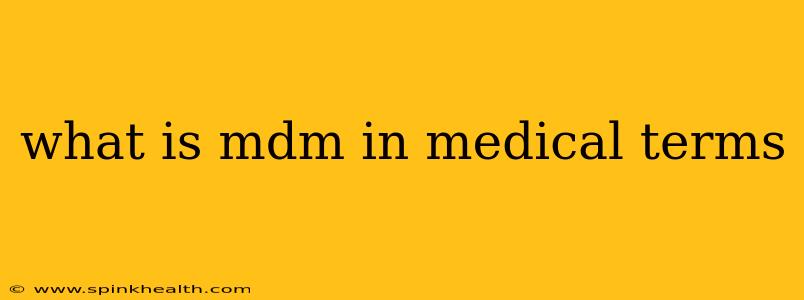What is MDM in Medical Terms? Unraveling the Mystery of Medical Decision Making
The seemingly simple acronym "MDM" in the medical world actually represents a complex and crucial aspect of patient care: Medical Decision Making. It's not a specific disease or treatment, but rather a description of the complexity involved in diagnosing and managing a patient's health condition. Understanding MDM is key to appreciating the nuances of healthcare billing and the level of care a patient receives.
Imagine yourself as a doctor. A patient walks in, complaining of a persistent cough. Is it a simple cold, a more serious infection, or something entirely different? That's where MDM comes in. It's the process of gathering information, analyzing it, and determining the best course of action. This journey often involves a winding road, filled with twists and turns, that leads to a final diagnosis and treatment plan.
What factors contribute to the level of MDM?
The complexity of MDM isn't uniform. It varies significantly depending on several key factors. Think of it like building a house: some houses are simple cabins, while others are sprawling mansions. Similarly, some medical cases are straightforward, while others demand extensive investigation and deliberation. Here's what influences the MDM level:
-
Number of problems addressed: A patient with only one issue (like a simple sprain) will have a lower MDM level than someone presenting with multiple complex problems (such as diabetes, heart disease, and kidney issues).
-
Amount and complexity of data reviewed: Does the diagnosis require simple observation, or does it involve reviewing extensive lab results, imaging scans, and specialist consultations? The more data reviewed, the higher the MDM level.
-
Risk of complications and morbidity/mortality: Some conditions are benign and easily managed, while others carry a significant risk of serious complications or even death. The higher the risk, the higher the MDM level.
-
Diagnostic uncertainty: The more ambiguous the initial presentation of symptoms, the more time and effort spent on diagnosis, and thus the higher the MDM level. The doctor may need to rule out various possibilities before arriving at the correct diagnosis.
-
Number of diagnoses and treatments: The more diagnoses the patient has and the more treatments they receive increases the level of MDM.
How does MDM impact healthcare billing?
The level of MDM directly impacts the physician's reimbursement. Healthcare systems use coding systems (like the Current Procedural Terminology, or CPT codes) to classify the complexity of the physician's work. Higher levels of MDM correlate with higher reimbursement rates because they reflect the greater time, expertise, and resources dedicated to the patient's care. This is not simply about "charging more"; it's about fairly compensating physicians for the substantial work involved in complex cases.
What are some examples of high vs. low MDM?
Low MDM: A routine physical exam with no significant findings. The doctor reviews basic vital signs and asks a few standard health questions. The diagnosis is simple and requires no specialized testing.
High MDM: A patient admitted to the hospital with a severe infection requiring multiple specialists, extensive testing, and several treatment adjustments based on continuous monitoring. The patient has multiple health issues that need to be monitored and considered, increasing the overall complexity of their care.
How is MDM determined?
Determining the level of MDM isn't an exact science. Physicians use their professional judgment based on established guidelines and coding systems. They meticulously document their clinical reasoning and decision-making process in the patient's medical record, ensuring transparency and justifying the MDM level for billing purposes.
In conclusion, MDM is a crucial, albeit often misunderstood, aspect of medical practice. It highlights the intellectual work and careful judgment involved in providing quality patient care. Understanding MDM helps to clarify the intricacies of healthcare billing and the crucial role of comprehensive medical assessment in providing the best possible outcome for each patient.

